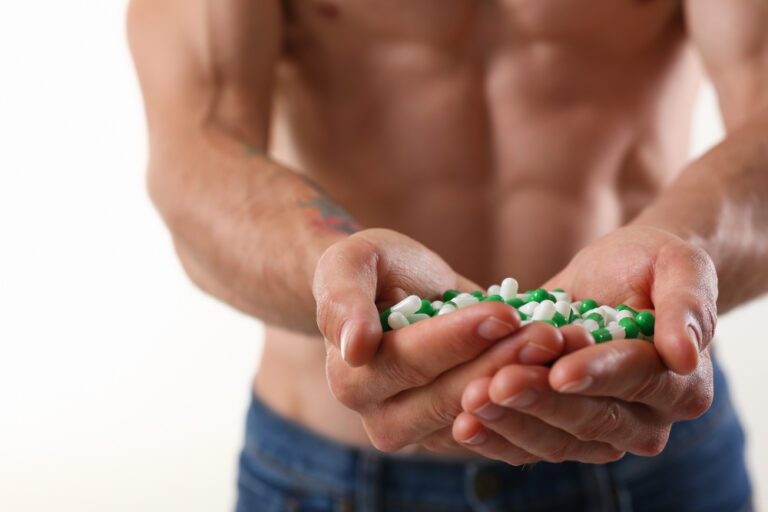
Testosterone boosters are supplements or medications claiming to raise testosterone for energy, strength, and sexual health. While prescription testosterone helps those with true deficiency, most over-the-counter boosters lack scientific proof, carry hidden risks, and may cause serious side effects when used without medical guidance.
Key Takeaways
- Prescription testosterone therapy is only for medically confirmed low testosterone under doctor supervision.
- Most OTC and “natural” boosters are unregulated, unproven, and often contain hidden or unsafe ingredients.
- Common side effects include hormonal imbalance, heart strain, liver damage, mood swings, and fertility loss.
- “Natural” or “herbal” labels do not guarantee safety or effectiveness.
- Healthier testosterone support comes from exercise, balanced diet, adequate sleep, and stress control.
- Medical experts strongly advise testing and consultation before using any testosterone-related product.
What Are Testosterone Boosters? Types and Claims

Testosterone boosters include any supplement, pill, or medication intended to increase testosterone. The main types are:
- Testosterone Supplements: Over-the-counter products with herbal or mineral ingredients, not prescription medications.
- Testosterone Pills: Prescription testosterone (for medical use) or non-prescription pills claiming to boost testosterone levels.
- Natural Testosterone Boosters: Plant extracts, vitamins, and minerals.
- Prescription Testosterone: Testosterone injections, patches, gels, or capsules prescribed by a doctor for diagnosed low testosterone.
- Steroids or Illegal Boosters: Some products contain anabolic steroids or illegal substances, posing serious risks.
Why Do People Use Testosterone Boosters?
Testosterone boosters are products that claim to increase the body’s testosterone levels to improve energy, muscle strength, and sexual health, especially in men as they age. There are several types of testosterone boosters, including prescription therapies for diagnosed low testosterone, herbal supplements, and over-the-counter pills.
- Address Testosterone Decline: Testosterone drops naturally with age, leading to fatigue, muscle loss, and lower sex drive. Boosters counter these changes.
- Build or Preserve Muscle: Testosterone maintains muscle. Some people use boosters to support muscle strength or recovery.
- Improve Sexual Health: Low testosterone causes reduced libido and sexual function. Boosters restore sexual desire or performance.
- Increase Energy and Mood: Low testosterone causes tiredness and mood changes. Boosters increase daily energy and improve mood.
- Manage Weight Gain: Lower testosterone links to higher body fat. Boosters support weight management.
- Reduce Other Aging Symptoms: Symptoms like memory issues and poor sleep relate to low testosterone. Boosters help improve these areas.
- Influence of Marketing: Advertisements promise youth, strength, or vitality, motivating people to try boosters.
Are Testosterone Boosters Safe?
Testosterone boosters are marketed as solutions to increase energy, muscle mass, and sexual function, especially as men age and experience a natural decline in testosterone. Prescription testosterone therapy can improve well-being in men with medically proven low testosterone, but only under a doctor’s supervision. Most over-the-counter and “natural” boosters sold online or in stores lack strong clinical evidence and proper regulation, making their safety and effectiveness questionable.
Many contain hidden ingredients or interact harmfully with medications, leading to risks such as hormonal imbalance, heart problems, liver toxicity, mood changes, and reduced fertility. Young people, women, those with chronic health issues, and older adults face heightened risks. Experts consistently warn against unsupervised use and suggest lifestyle changes such as exercise, healthy diet, weight management, and quality sleep as safer ways to support natural testosterone. Always consult a healthcare provider before considering any testosterone product.
Myths vs Facts about Testosterone Booster Safety
There are several common myths about the safety of testosterone boosters that can be misleading, especially for those seeking more energy, strength, or improved sexual health as they age. Many believe all testosterone boosters are safe, but in reality, many products carry unknown risks and side effects.
| Myth | Fact |
|---|---|
| All testosterone boosters are safe | Many have unknown risks or side effects |
| More testosterone is always better | Excess testosterone harms the heart, liver, and fertility |
| Natural means safe | Natural does not guarantee safety or effectiveness |
| OTC boosters work for everyone | Most OTC boosters lack evidence and do not work |
Natural Testosterone Boosters

Natural boosters often contain herbs or minerals like fenugreek, ashwagandha, DHEA, or zinc. Some small studies show certain ingredients slightly influence hormone levels, but most research finds effects are modest at best.
The “all-natural” label is misleading. Some natural ingredients interact with medications, raise blood pressure, or cause other health problems. For example, DHEA disrupts hormone balance, and high doses of zinc cause nausea and immune issues. Older adults with chronic illnesses face particular risk for side effects.
Regulation of natural supplements is weak. Studies by the FDA found some so-called “natural” boosters contain unlisted drugs or hormones, which are dangerous. Always consult a healthcare provider before trying these products.
Over-the-Counter Testosterone Boosters
Over the counter testosterone boosters sold in stores and online are not regulated like prescription drugs. The main risks:
- Over-the-counter (OTC) testosterone boosters are widely sold as supplements claiming to improve energy, boost muscle growth, and enhance sexual health without a prescription.
- These products are not regulated with the same strict standards as prescription medications, resulting in wide variation in their quality and contents.
- Most OTC boosters lack strong clinical evidence supporting their effectiveness in raising testosterone levels or delivering promised health benefits.
- Some products contain hidden or mislabeled ingredients, including illegal steroids or prescription drugs, increasing the risk of harmful side effects.
- Commonly reported side effects include hormonal imbalance, liver strain, heart issues, acne, and mood swings.
- OTC boosters also interact negatively with other medications, creating additional health risks, especially for older adults and those with chronic illnesses.
- Major health organizations and medical experts urge caution, advising consumers to consult a healthcare provider before using any testosterone-boosting supplement.
- Safer alternatives include promoting testosterone through regular exercise, balanced nutrition, healthy weight, and adequate sleep.
Common OTC Ingredients and Known Side Effects
Many over-the-counter testosterone boosters include ingredients like fenugreek, DHEA, tribulus, zinc, and ashwagandha. These ingredients are promoted for their supposed effects on hormone balance, muscle growth, energy, and libido.
| Ingredient | Claimed Effect | Possible Side Effects |
|---|---|---|
| Fenugreek | Boost testosterone, libido | GI upset, allergic reactions |
| DHEA | Hormone balance | Acne, hair loss, mood changes |
| Tribulus | Muscle, libido | Sleep problems, irregular periods |
| Zinc | Testosterone support | Nausea, immune changes (high dose) |
| Ashwagandha | Stress, testosterone boost | GI upset, sedation, thyroid risk |
Who Should Be Extra Cautious?
Certain groups face higher risk from testosterone boosters:
- Young adults and teens disrupt their natural hormone balance, leading to long-term reproductive or mental health issues.
- Women, especially those of childbearing age or with certain conditions, experience hair growth, voice changes, or fertility problems.
- Older adults with chronic illnesses or multiple medications risk drug interactions (blood pressure, diabetes, or heart disease medications). Those with a history of cancer, prostate issues, or hormone-sensitive conditions should not use testosterone boosters except under strict medical supervision.
Medical experts urge anyone considering testosterone boosters, especially over age 50, to first consult a healthcare provider and get proper hormone testing before starting any product.
Do Testosterone Boosters Help Build Muscle?
Prescription testosterone helps men with low testosterone regain muscle, but only when medically needed. Most over-the-counter or “natural” testosterone boosters do not lead to significant muscle gains in healthy adults according to research. Prescription testosterone therapy supports muscle recovery only for men with clinically low testosterone under medical supervision.
Illegal or unregulated boosters, such as anabolic steroids, do build muscle but cause severe health complications including heart attack and liver damage. For most people, the proven and safest way to increase muscle mass is through regular strength training, eating enough high-quality protein, and following healthy lifestyle habits. Relying on unproven supplements for muscle growth introduces risks like hormone imbalance and adverse effects, making them a poor alternative to effective exercise and nutrition approaches.
Testosterone Boosters Side Effects
All testosterone boosters, whether prescription, OTC, or natural, cause side effects. The most common and serious risks include:
- Hormonal imbalance (too much or too little testosterone)
- Liver toxicity (especially with oral or illegal steroids)
- Heart risks (blood clots, increased blood pressure, heart attack)
- Mood swings, anxiety, depression, aggression
- Acne and hair loss or unwanted hair growth
- Fertility problems (reduced sperm count, testicular shrinkage)
Are There Any Safe Testosterone Boosters?
The safest options are prescription testosterone therapies, prescribed after thorough testing and monitoring. These are appropriate for people with proven testosterone deficiency and under medical supervision.
Self-medicating with supplements or buying boosters online is unsafe. Major health organizations recommend lifestyle changes first such as weight loss, exercise, sleep, and managing chronic disease which raise or optimize testosterone levels naturally.
No over-the-counter booster is guaranteed safe. Always rely on medical advice and be wary of claims that sound too good to be true.
What the Experts Say about Testosterone Boosters
- Mayo Clinic: Only use medically supervised testosterone therapy. OTC boosters are unregulated and unsafe.
- Cleveland Clinic: Warns about hidden ingredients and unproven claims in supplements. Prescription therapies are only for confirmed low testosterone.
- Endocrinology Societies: Emphasize individual assessment, regular monitoring, and caution with any hormone-altering product.
Safer Alternatives to Boost Testosterone
Safer alternatives to boost testosterone focus on lifestyle habits and overall health rather than using supplements or over-the-counter pills.
- Maintain a healthy weight and avoid obesity.
- Get enough vitamin D through sunlight or supplements.
- Include zinc-rich foods like nuts, beans, and seafood.
- Limit processed foods and added sugars.
- Stay hydrated.
- Get regular, quality sleep every night.
- Practice relaxation techniques such as meditation or yoga.
- Avoid exposure to endocrine disruptors (like plastics containing BPA).
- Stay socially connected and maintain positive relationships.
- Schedule regular health check-ups and manage chronic conditions.
Conclusion
Testosterone boosters often seem like a quick solution for low energy or declining vitality with age. The safety and effectiveness of these products depend on the specific type and personal health factors. Prescription testosterone therapy benefits men diagnosed with true low testosterone, improving mood, energy, and quality of life. Most over-the-counter boosters and supplements lack clinical proof, and some present health risks such as heart or liver problems. Older adults face particular dangers. Before trying any testosterone product, always consult your doctor for evaluation and guidance.
Frequently Asked Questions (FAQ)
Are testosterone boosters safe for everyday use?
Regular use of testosterone boosters disrupts hormone balance and increases health risks, especially for older adults or those with underlying medical conditions. Use only under a doctor’s supervision.
Can natural testosterone boosters interact with my medication?
Natural boosters interact with medications for blood pressure, diabetes, and blood thinners. These interactions are harmful. Consult your doctor before combining supplements with prescription drugs.
How long does it take to see results from testosterone pills?
Prescription testosterone often takes a few weeks to show results. Most over-the-counter pills do not provide meaningful changes.
Do testosterone boosters affect fertility?
Both supplements and prescription testosterone lower sperm production and reduce fertility, sometimes permanently. Discuss all options with your doctor if you want children.
Are there foods that act as safe testosterone boosters?
Healthy foods like lean meats, nuts, and leafy greens support normal testosterone, but no food alone treats low testosterone. A healthy diet supports testosterone but does not replace medical evaluation or therapy.
Is it safe to buy testosterone supplements online?
Online supplements are unregulated and contain unsafe or banned substances. The safest way to get hormone treatments is through a licensed healthcare provider.
Can women take testosterone boosters safely?
Women should use testosterone therapy only if prescribed for a specific condition. Unsupervised use causes serious side effects like voice changes or hair growth.
Should young adults consider testosterone boosters for muscle gain?
Young adults should avoid testosterone boosters for muscle gain, as they interfere with natural hormone development and cause long-term health problems.
When should I see a doctor about low testosterone?
See your doctor if you experience ongoing tiredness, reduced sex drive, or muscle loss. Proper testing determines if low testosterone is the cause and if treatment is needed.
Are prescription testosterone therapies safer than boosters?
Prescription testosterone is safer when used under medical supervision for diagnosed low testosterone. Unregulated boosters have unpredictable ingredients and risks. Doctor-prescribed therapy remains safer than over-the-counter options.
References
- Medical News Today
- Mayo Clinic
- Cleveland Clinic
- Healthline
- U.S. Food and Drug Administration (FDA)
- World Journal of Men’s Health
Dr. Ethan Ward, MD, is a board-certified urologist with over 12 years of clinical experience specializing in men’s health, hormone optimization, and sexual wellness. He earned his MD from Johns Hopkins University School of Medicine and completed his urology residency at Cleveland Clinic. Dr. Ward focuses on testosterone therapy, erectile function, and metabolic contributors to hormonal imbalance. His work includes peer-reviewed research on andropause management and patient-centered approaches to male vitality.


